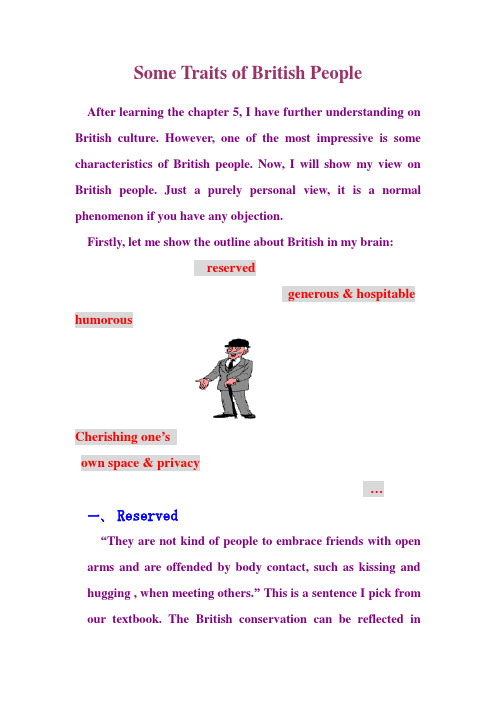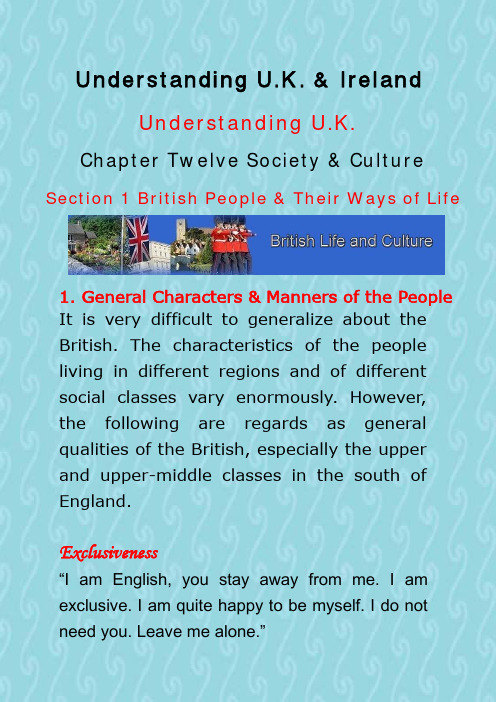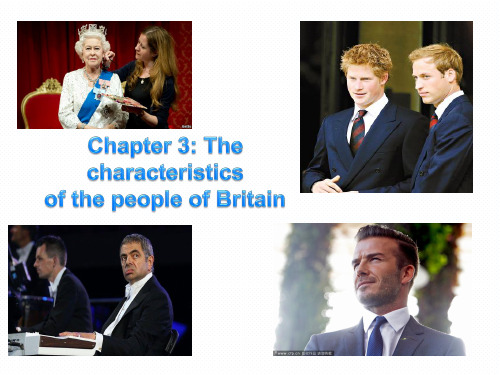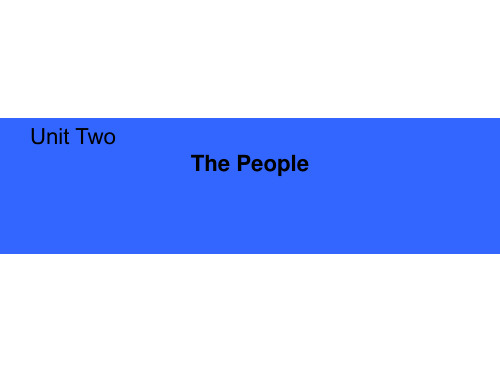British People
- 格式:ppt
- 大小:174.50 KB
- 文档页数:7

Title: The British in My EyesAs the world becomes increasingly globalized, cultures from every corner of the globe are converging, sharing, and influencing each other. Among these cultures, the British culture, with its rich history and unique traditions, has always held a special place in my heart. Through my interactions with British people, my studies of their history and literature, and my visits to their beautiful country, I have come to form a deep and abiding respect for the British and everything they represent.The British are known for their reserve and politeness. This is a trait that I have found to be particularly endearing. Wherever I have traveled in Britain, whether it be the bustling streets of London or the quiet countryside villages, I have always been struck by how genuinely friendly and helpful the people are. They are quick to offer directions, recommendations, or just a friendly smile, and they do so with a charm and grace that is uniquely British.Another aspect of British culture that I admire is their deep respect for history and tradition. The British have a rich historical legacy that they cherish and preserve. From the ancient castles and stone circles dotting the landscape to the royal palaces and stately homes that are still used today, theBritish take great pride in their historical heritage. This respect for the past is also reflected in their customs and traditions, which are steeped in centuries of history and are still observed and celebrated with great enthusiasm.The British are also known for their love of literature and the arts. From Shakespeare to Rowling, the British have produced some of the world's greatest writers and storytellers. Their literature is rich, diverse, and deeply influential, shaping not only their own cultural identity but also contributing significantly to global culture. Similarly, the British art world is thriving and innovative, with a vibrant mix of traditional and contemporary art that is both inspiring and thought-provoking.What truly sets the British apart, however, is their unwavering commitment to fairness, equality, and justice. These values are deeply ingrained in their society and are reflected in everything from their political system to their social policies. The British have a long history of standing up for what is right and fighting against injustice, and this commitment to equality and fairness is something that I deeply admire.In conclusion, the British in my eyes are a people who are polite, reserved, and deeply respectful of their history and traditions. They are passionate about literature and the artsand are committed to fairness, equality, and justice. Through my interactions with them and my studies of their culture, I have come to appreciate and admire these qualities, and I believe that they are qualities that we can all learn from and aspire to emulate.As I look towards the future, I hope to continue to deepen my understanding of British culture and to form even stronger bonds with the British people. I believe that by learning from each other and embracing our differences, we can create a more harmonious and understanding world. And in this world, the British, with their unique blend of tradition and innovation, politeness and passion, will continue to play a pivotal role.。

Some Traits of British PeopleAfter learning the chapter 5, I have further understanding on British culture. However, one of the most impressive is some characteristics of British people. Now, I will show my view on British people. Just a purely personal view, it is a normal phenomenon if you have any objection.Firstly, let me show the outline about British in my brain:reservedgenerous & hospitable humorousCherishing one’sown space & privacy…一、Reserved“They are not kind of people to embrace friends with open arms and are offended by body contact, such as kissing and hugging , when meeting others.” This is a sentence I pick from our textbook. The British conservation can be reflected inmany ways.It is obvious on wearing, British women’s clothes are almost in pure color and have no pattern.If in contrast with other countries, the conservation of British become more prominent.When the Americans invented central air conditioning, the British still refused to accept the new thing, they continue to use the fireplace and electric furnace because they are afraid that those new things may do harmful to their health. From my part, the British are so conservation that they may not dare to have a cool under the tree with short trousers and vest, such as what Chinese always do.I think it may difficult to change its conservation because they are used to it. As a sentence in our textbook: At an early age, children are taught to control their feeling and keep a “stiff upper lip”.二、humorous“The British have a wonderful sense of humor”.Mark Twain had written a paragraph which show his point about the different laugh point between America and Britain. He said that British humor is usually need to think before laugh, and American humor are more like akind of performance. I think it is a masochistic humor, for it reminds me of Mr. Bean. In fact, Mr. Bean let me feel a different sense of humor, he entertain others by performing his stupid.As far as I am concerned, British humor included their special wisdom.三、Cherishing one’s own space & privacy“It is not uncommon for people to live next door to each other for years and never exchange more than a polite greeting or know anything about each other’s private things”.May be in China, “Have you ate” is a kind of friendly greeting, but it is seen as an unacceptable way for British. In Britain, people obey a phrase: My home is my castle. The wind can come in, but the Kings and Queens and human beings can never come in without my permission. They may build a fence around their house so that they can separate from their neighborsAs the textbook said:“In fact, he might consider it to be quiet an imposition if a stranger tried to strike up a conversation with him.”So, don’t talk with Britishcausally, or may be you will leave a bad impression on him.In my opinion, Every country has it own custom, we’d better show our respect for them. When in Rome, do as the Romans do.The above is some of my understandings and views to British. In fact, I want to know them face to face more than from textbook, traveling to aboard is one of my dream, and I will travel to UK one day when I have enough ability. May be at that time I will have a different view on them.Thanks for read my article.From:章逸珮(Riki)英教A班27号2014年5月17日。


Understanding U.K. & IrelandUnderstanding U.K.Chapter Twelve Society & Culture Section 1 British People & Their Ways of Life1. General Characters & Manners of the People It is very difficult to generalize about the British. The characteristics of the people living in different regions and of different social classes vary enormously. However, the following are regards as general qualities of the British, especially the upper and upper-middle classes in the south of England.Exclusiveness“I am English, you stay away from me. I am exclusive. I am quite happy to be myself. I do not need you. Leave me alone.”This is the best-known quality of the British people, particularly of the English people. That is because of the special geographical location and the distinct development of its history. King James Bible, Shakespeare’s plays, the British parliament as early as 1215 and the Industrial Revolution account for the shaping of their general character.ConservativenessGenerally speaking, the British tend to be reserved. They have to wait a long time before they are prepared to try something new; they do not accept change although they are told to, for example, the use of fireplaces in the large cities such as London, Liverpool, Manchester and BirminghamPolitenessLanguage—Most British people use the words "please" and "thank you" all the time, particularly when asking for or after receiving help from someonePunctuality—British people expect punctuality especially in the work place or place of study. This means that if a lecture begins at 2pm, you must be present in the lecture room at or before 2pm. If you have an appointment with a doctor or a tutor at 11am, you should be there no later than 11a.m., otherwise you will probably not be able to see them.Day to day etiquette—British people will normally queue in shops or whilst waiting for buses, buying tickets and so on. You should expect to do the same.—Most people in the UK have a mobile telephone. It is considered impolite to use a mobile telephone in certain formal situations such as in lectures and meetings.—When you are invited to dinner, ten minutes late is excellent. When at table, it is polite to sit straight, to keep your elbows off the table and never to talk with your mouth full of food; you have to copy everyone else, ask what todo if you are not sure and keep the conversation going.—It is customary to leave a 10% tip when eating in restaurants for good service (but not in fast food restaurants such as McDonalds.)Love of privacyThe following words best describe British people’s attitude towards privacy.“My home is my castle. The wind can come in, but the Kings and Queens and human beings can never come in without my permission.”Stiff upper lipThe British do not show their feelings very much. They do not show their emotion if they are very happy and nor if they are sad. They always keep a stiff upper lipSense of humorThe humor is self-deprecating, that is, laughing at oneself. The British enjoys makingfun of their own customs, class system and even their government.2. Ways of LifeIntroductionKnowing the customs of a country is, in effect, a guide to understanding the soul of that country and its people. Britain is the birthplace of Newton, Darwin, Shakespeare and the Beatles, home of the world's largest foreign exchange market and the world's richest football club—Manchester United, the inventor of the hovercraft and the JK Rowling, the author of the Harry Potter books. From Scotland to Cornwall, Britain is full of customs and traditions. A lot of them have very long histories. Some are funny and some are strange. But they're all interesting and are all part of the British way of life. Throughout this section you will have the chance to discover the customs and traditions of Great Britain.Marriage and Family LifeThe family in Britain is changing. The once typical British family headed by two parents has undergone substantial changes during the twentieth century. In particular there has been a rise in the number of single-person households. By the year 2020, it is estimated that there will be more single people than married people. Fifty years ago this would have been socially unacceptable in Britain.In the past, people got married and stayed married. Divorce was very difficult, expensive and took a long time. Today, people's views on marriage are changing. Many couples, mostly in their twenties or thirties, live together without getting married. Only about 60% of these couples will eventually get married.In the past, people married before they had children, but now about 40% of children in Britain are born to unmarried parents. In2000, around a quarter of unmarried people between the ages of 16 and 59 were cohabiting in Great Britain. Before 1960 this was very unusual, but in 2001 around 23 percent of births in the UK were to cohabiting couples.Marriage is legal at age 16 but usually takes place when people are in their mid- to late 20s and many women do not want to have children immediately. They prefer to concentrate on their jobs and put off having a baby until late thirties. The number of single-parent families is increasing. This is mainly due to more marriages ending in divorce, but some women are also choosing to have children as lone parents without being married.HousingHouses in Shakespeare’s hometown Stratford-on-AvonRetirement HomeMost people in England live in urban areas. In England, an average of 7,000 hectares of farmland, countryside and green space were converted to urban use every year between 1985 and 1998.More people are buying their own homes than in the past. About two thirds of the people in England and the rest of Britain either own, or are in the process of buying, their own home. Most others live in houses or flats that they rent from a private landlord, the local council, or housing association.People buying their property almost always pay for it with a special loan called a mortgage, which they must repay, with interest, over a long period of time, usually 25 years.Most houses in England are made of stone or brick from the local area where the houses are built. The colors of the stones and bricks vary across the country.England has many types of homes. In the large cities, people often live in apartments, which are called flats. In most towns, there are streets of houses joined together in long rows. They are called terraced houses.The main types of houses in England are: •Detached (a house not joined to another house) •Semi-detached (two houses joined together) •Terrace (several houses joined together)•Flats (apartments)Information taken from Census 2001The most popular type of home in England is semi-detached (more than 27% of all homes), closely followed by detached and then terraced. Almost half of London's households are flats, maisonettes or apartments.EatingBritain has a very diverse population due to the large number of immigrants, this provoked that the food was diversified.British food has traditionally been based on beef, lamb, pork, chicken and fish and generally served with potatoes and one other vegetable. The most common and typical foods eaten in Britain include sandwich, fish and chips, pies like the Cornish pasty, trifle and roasts dinners. Some of the main dishes have strange names like Bubble & Squeak and Toad-in-the-Hole.The staple foods of Britain are meat, fish, potatoes, flour, butter and eggs. Many of the dishes are based on these foodsSome of the most traditional foods are described below:Fish and chips are a classic,traditional national food ofEngland, made up withFrench fried potatoes andthe fish deep fried in flourbatter.Yorkshire pudding is a traditional and popular British dish, originating from the North-east of England, made from flour, eggs and milk, is a sort of batter baked in the oven and usually moistened with gravy.Traditional Yorkshire puddingToad-in-the-Hole is similar to Yorkshire pudding but with sausages placed in the batter before cooking.Toad-in-the-HoleBubble & SqueakBubble and squeak (sometimes just called bubble) is a traditional English dish made with the shallow-fried leftover vegetables from a roast dinner. The chief ingredients are potato and cabbage, but carrots, peas, brussels sprouts, and other vegetables can be added. It is traditionally served with cold meat from the Sunday roast, and pickles. Traditionally, the meat was added to the bubble and squeak itself, although nowadays it is more commonly made without meat. The cold chopped vegetables (and cold chopped meat if used) are fried in a pan together with mashed potato until the mixture is well-cooked and brown on the sides.Lancashire Hotpot consists essentially of meat, onion and potatoes baked in the oven all day in a heavy pot and on a low heat.Lancashire HotpotNowadays many traditional foods such as beef and potatoes have given way to poultry and pasta dishes. Fast food has also become more available, and hamburger restaurants now rival the traditional fish-and-chip shops in popularity. Numerous Chinese and Indian restaurants and pizza houses provide take-away service, and many pubs (public houses) serve anything from snacks to full meals as well as alcoholic beverages.The English people generally eat three meals a day. A traditional English breakfast consists of any or all of the following: bacon, sausages, grilled or fried tomatoes, mushrooms, eggs, or toast. Kippers (smoked herring) or black pudding (blood pudding) may also appear on the menu.Traditional English breakfastHowever, fewer people now eat a cooked breakfast on a regular basis, preferring various combinations of cereal, toast, juice or fruit, and tea or coffee.The midday meal is usually referred to as lunch and the evening meal as dinner or, when it is less formal, as supper. Working-class people tend to call the midday meal dinner and the meal they have in the early evening “tea.” The tradition of afternoon tea, when tea, biscuits, and cakes are enjoyed at about 4 pm, has declined. Similarly, many people no longer have more than a light lunch or snack in the middle of the day.SocializingThe English often say “How do you do?” or “Pleased to meet you” when meeting for the first time. People usually shake hands when first introduced or when greeting and parting in business and other formal situations.Otherwise many English people will simply say “Hello” when they see each other. Among friends, women are often kissed (by men and women) lightly on one cheek.The use of first names is widespread; titles such as “Mr.” and “Mrs.” are being used less frequently, even when children address adults.It is customary to respect people’s privacy by telephoning before visiting. When invited to a meal by friends, guests often bring a bottle of wine or another small gift.Pubs continue to be one of the main places for people to get together in the evenings. Older people often meet their friends in the morning, to chat over coffee or tea and a scone. Relaxing in the home, however, is still more popular.Sports and RecreationSports play an important part in the life of the Englishmen and are a popular leisure activity. A great number of major sports originated in the United Kingdom, including: football (soccer), squash, golf, boxing, rugby (rugby union and rugby league), cricket, snooker, billiards, badminton and curling.Cricket — England's national sport is cricket, which is a bat and ball game played between two teams. It is a traditional summer sport and is often played on village greens on Sundays from April to August. No one is sure when cricket was invented, but there are records of the game being played as early as the sixteenth century.Football (soccer) — Winter time national sports are football (soccer) and Rugby Union. Football is undoubtedly the most popular sport in England and has been played for hundred of years. Some of England's football team are world famous, the most famous being Manchester United, Arsenal and Liverpool. In the English Football League there are 92 professional clubs. These are semi-professional, so most players have other full-time jobs. Hundreds of thousands of people also play football in parks and playgrounds just for fun. The highlight of the English football year is the FA (Football Association) Cup Final each May.Rugby — Rugby originatedfrom Rugby school inWarwickshire. It is similarto football, but played withan oval ball. Players cancarry the ball and tackleeach other. The best rugby teams compete in the Super League final each September. For many years Rugby was only played by the rich upper classes, but now it is popular all over the country.Tennis —Modern lawn tennis was first played in England. The world's most famous tennis tournament is Wimbledon. It started at a small club in south London in the nineteenth century. It begins on the nearest Monday to June 22, at a time when English often have the finest weather. Millions of people watch the Championships on TV live. It is traditional for visitors to eat strawberries and cream whilst they watch the tennis.Horseracing — one of themost popular spectatorsports is horseracing (overjumps in the winter and ona flat track in the summer).People can place bets on the races at legal off-track betting shops. Some of the best-known horse races are held at Ascot, Newmarket, Goodwood and Epsom.Ascot, a small town in the south of England, becomes the centre of horse-racing world for one week in June. It's called Royal Ascot because the Queen always goes to Ascot. She has a lot of racehorses and likes to watch racing.Queen enjoys watching horse racingRowing — In the nineteenth century, students at Oxford and Cambridge, Britain's two oldest universities were huge fans of rowing. In 1829, the two schools agreed to hold a race against each other for the first time on the Thames River. The Oxford boat won and a tradition was born. Today, the University Boat Race is held every spring in either late March or early April.1921 Oxford Cambridge Boat Race SceneOxford and Cambridge crews racing eachother in their annual contest, Cambridgebarely won the race.Fox hunting —Traditionally Boxing Day is a day for fox hunting. The huntsmen and huntswomen ride horses. They use dogs too. The dogs (fox hounds) follow the smell of the fox. Then the huntsmen and huntswomen follow the hounds.Before a Boxing Day hunt, the huntsmen and huntswomen drink hot wine. But the tradition of the December 26th is changing. Now, some people want to stop Boxing Day hunts (and other hunts too). They don't like fox hunting. For them it is not a sport - it is cruel.With the exception of U.S. citizens, the British watch more television than anyone else in the world and claim that one reason for this is the high quality of British programming. Videos are also popular, but many people equally enjoy seeing films at the cinema. All types of music and theater are well supported. The country is also rich in art galleries and museums.。

